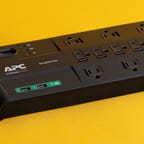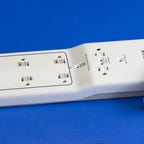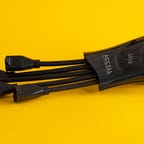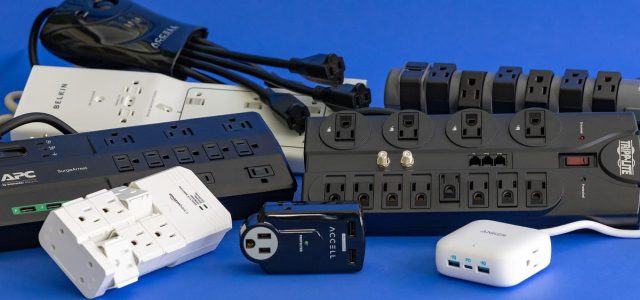
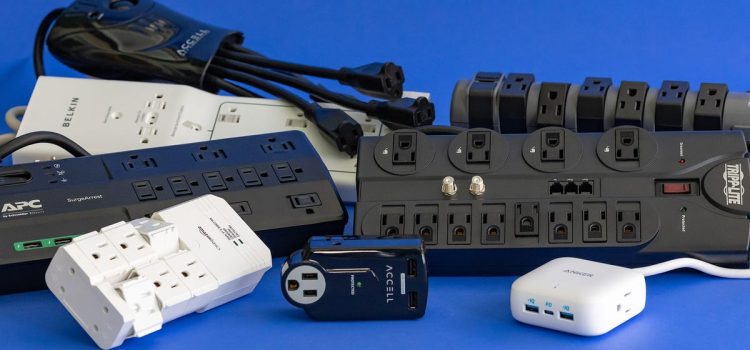

What is the best surge protector overall?
We put 16 of the top surge protectors under $100 to the test, and against all of our requirements the APC P11U2 hit the mark, impressing us with its 11 outlets — six of which have a wide spacing to accommodate larger power adapters — along with its USB ports that allow you to directly charge your devices, its high joule rating (more on that in a bit) and its long power cord. It even comes with a lifetime $250,000 equipment protection policy, which can provide a little peace of mind. That, along with its exceptional functionality, makes this our recommendation for the best surge protector you can get right now. However, if you’re looking for a specific feature or a smaller size (the P11U2 is pretty large), we have more recommendations below.
So why do you need surge protection anyway? We’ve all got lots of electronics we want to plug in, with power strips upon power strips branching out like stubby snakes from every outlet. OK, maybe it’s not that bad in your own house, but even beyond the convenience of extra plugs, the best surge protectors can actually prolong the life of your gear. They can, as the name suggests, protect electronics from the power surges that can slowly wear down the delicate hardware inside all modern electronics.
Though the terms are often used interchangeably, there is a big difference between power strips and surge protectors. A power strip is essentially just a wired, multi-outlet extension of a power outlet. A surge protector adds in circuitry, which is designed to prevent damaging power spikes from making their way to your TV, soundbar or really anything that’s plugged in.
One of the easiest ways to tell if the product you’re considering is a basic strip or an actual surge protector is by checking if it has a joule rating. All surge protectors will have one, and it’s essentially how much of a power surge it can protect against. These devices do wear down over time, and while there’s no easy way to tell how much the protection is reduced, some strips do offer a dedicated “protected” LED. Most manufacturers recommend replacing a surge protector every few years. For more about how they work, check out these 10 shocking facts about power strips.
Best surge protectors
The APC P11U2 checks all the boxes for what I was looking for in a surge protector. It has six widely spaced plugs, plus five more that are closer together and two USB ports. It has 2,880 joules of protection, well above my test’s average. Coincidentally, editor Ty Pendlebury has one in his testing lab. APC offers a lifetime $250,000 equipment protection policy.
Overall build quality is quite solid, even though the protective covers for each outlet are superfluous and come off easily. The cord to connect the power strip to the wall is quite long, 8 feet, which is convenient. The P11U2 is fairly bulky, but if you want something smaller and don’t need 11 outlets, the $33 APC P8U2 loses one row of the wide-spaced outlets for a much smaller footprint overall, though the joule rating and protection policy are also lower.
It’s not flashy, and doesn’t have some of the features of some of my other picks, but for a basic, solid, surge protector, it’s the one to get.
If the APC above isn’t available or you’re looking for something a little different, the Tripp Lite TLP1208TELTV offers most of the features we like about the APC. It only has four wide-set outlets, but eight close-spaced ones. There’s no USB, but instead you get three RJ11 for telephone (one in, two out) and two coax for cable or satellite. It has a claimed 2,880 joule rating. I have one in my testing lab.
It has an 8-foot cord, and comes with $150,000 “Ultimate Lifetime Insurance” coverage and a limited lifetime warranty.
It’s usually a little more expensive than the APC, but if you want something to protect landlines or cable/satellite, it’s ideal.
The Belkin F7C01008q has a handy feature: It comes with a wireless switch. Six of the eight wide-spaced outlets are controlled by this switch, which you can mount somewhere nearby via its included wall mount and sticky-tape. The protector itself is very flat, with far less bulk than the APC or Tripp Lite.
The fancy remote control comes at a cost, however. The surge protector has a claimed 1,000 joule rating, which is lower than my top picks. It has a shorter cord too, though at four feet it should be long enough for most situations. The Conserve Switch has a 1-year warranty on itself, and $100,000 for connected equipment.
If you like the look of this design but don’t need the switch, check out the Belkin BE112230, listed in the Others We Tested section below.
Read our Belkin Conserve review.
The Accell D080B-051B looks like a squid. Or maybe a six-legged octopus. (Hexapus?) I feel like this is enough reason to buy it, but it may not be for everyone. Its main benefit is that, instead of rigid outlets on a flat frame, like most surge protectors, it has five short cables with the outlets at the end. Most people probably won’t need this specific type of functionality, but I’m sure some of you are looking at it and know exactly how it will fit in your home. Also, you know, the squid thing.
The Accell is rated at a claimed 1,080 joules. Unlike most surge protectors, which continue to pass power when they’ve passed their joule rating, the D080B-051B fails safe, cutting power so your gear is protected against further surges. You will need to buy a new one if this should happen, but the whole point is to protect your more expensive gear. It’s surprising that more surge protectors aren’t built like this.
Unlike the others on my list, though, there’s no device warranty. While this is disappointing, it’s not a total deal-breaker, as I discuss below.
Unlike most surge protectors, the Belkin BP108000 is tubular instead of being box-shaped. Long and thin, it can sit behind or under furniture better than most other designs. Seven of its nine outlets rotate almost 180 degrees, so you can fit big charger wall warts on all of them. The other two outlets are widely spaced from each other, but are close to the bottom of the protector. This won’t be an issue if you’re plugging in cables, but grounded wall warts might not fit correctly.
It has a claimed 1,800 joule rating, and comes with a $150,000 Connected Equipment Warranty. In addition to the power outlets, there are also one in and out RJ11 telephone connections. The cable to the wall is 6 feet long.
The Amazon S9P658O300A00 plugs directly into your wall outlet, adding four more places for plugs. All six outlets on this Amazon Basics protector turn 90 degrees, so you can accommodate up to six wall warts if you turn the top and bottom plugs in the opposite direction of the middle ones.
It’s rated for a claimed 1,080 joules. It doesn’t have a connected equipment warranty.
The small PowerPort Strip PD 2 Mini is perfect for placement on a desk or table where you often connect devices via USB to charge, and occasionally additional wall warts. It has a surge rating of 440 joules. The USB-A ports max out at 2.4 amps each, while the USB-C port is capable of 3A at 5V or 2A at 9V.
The PowerPort Strip PD 2 Mini is also good for travel, thanks to its small size and 5-foot cord, though the Accell (mentioned below) is better for those who prefer to travel light.
If you want to connect big, or wide wall warts, the PowerPort Strip PD 2 Mini isn’t ideal. As you can see from the photo, it doesn’t have much space on either side of its outlets. If you’re regularly connecting bigger warts, check out the Belkin SRA006p3tt5 mentioned in the “Other good surge protectors” section below.
The Accell D080B-011K is a fantastic option for travelers, with a small size and foldable prongs. It has three outlets, one each on the front and sides, plus two USB-A connections. The latter are fairly slow, however, sharing 2.1 amps between them. It has 612 joules of surge protection, and a five-year, $100,000 connected equipment warranty.
If you just want something small to fit in your carry-on, the Accell is perfect. If you don’t mind more bulk, the Anker mentioned above has a long cable for easier connection to the notoriously hard-to-find hotel AC outlets.
How I tested surge protectors
When I tested these surge protectors there were three things I looked for: well-spaced sockets, a high joule rating (preferably 1,000 or more), and whether it came with a “connected device” warranty. Firstly, one of the most important things was having enough outlets to fit the wall wart power adapters that come with most products. These bulky connectors usually take up two or more spaces on normal outlets and power strips. So I physically checked each power strip to see if its outlets were sufficiently spaced to fit multiple warts.
Secondly, a joule rating was required, and all my picks had joule ratings comparable to or higher than their competitors. It’d be great to have a minimum or recommended joule rating, but such a thing doesn’t exist for these kinds of products.
I also gave preference to products that come with a guarantee in case your gear gets destroyed by a power surge. Nearly all of my picks have this kind of warranty, often in the range of hundreds of thousands of dollars. Are you likely to get your money back if your gear gets zapped? Hard to say. Insurance like this is hard to collect on, as some companies will only replace connected gear “at their option.” Having this sort of guarantee does give you some peace of mind, however, more than you have without it, and perhaps it will cover you in a way your homeowner’s or renter’s insurance doesn’t.
With all of this in mind, I compiled a list of nearly 50 surge protectors and then chose the top 16 to test out. My last bit of testing was hands-on. Specs can tell you a lot, but very quickly I found some of these to be better than others. Some had features that seemed useful, but weren’t. Others were larger or smaller than they seemed in pictures, which in some cases was a good thing or in the case of the travel surge protectors, not so much. Our top picks were the ones that had the best combination of features, specs, and felt the most practical in normal use.
Read More: 10 Shocking Facts About Power Strips
Other good surge protectors
The APC P6WU2 is a chunky wall-mount design with six side-mounted outlets and two USBs on the front. Depending on what you’re plugging into it, they might bunch up or not fit against the wall. The Amazon S9P658O300A00 can fit more plugs for a somewhat-similar footprint. However, the APC has a connected device warranty ($50,000), while the Amazon doesn’t. For something similar but smaller, check out the Belkin BSV300ttCW mentioned below.
The Belkin BE112230 shares the flat design of the switched Belkin F7C01008q, just without the switch. It has six wide-spaced outlets, a claimed 3,940 joules of protection and a connected equipment warranty.
The Belkin BST300bg is a decent travel alternative to the Accell. It has three outlets on the front and two USBs on the top. The plug swivels so you can orient it multiple ways. The Accell is a little smaller, but this is a good runner-up.
The wall-mounted Belkin BSV300ttCW has three outlets and two USBs, all on the front. Its most interesting design feature is a lipped top surface where you can lean your phone while it’s charging.
The cube-shaped Belkin SRA006p3tt5 is similar to the Anker, in that it’s a small protector at the end of a long cord. The Anker’s smaller size and dedicated USB-C connection are more convenient, but if you’re connecting larger wall warts they’ll likely fit better on this.
Frequently asked questions about surge protectors
Are smart surge protectors worth it?
You might have noticed I haven’t included any “smart” surge protectors, i.e. those that connect to a smart home via Alexa, Siri or Google Home. As of this writing smart surge protectors are inexplicably expensive. You’re better off buying a basic smart plug, or even several, and connecting a power strip. This is a cheaper solution than the smart surge protectors currently on the market.
Is it bad to plug too many things into a surge protector?
Yes, though depending what you’re trying to connect, it might not matter. The outlets in most American homes are either 15 or 20 amps. This equals approximately 1,800 to 2,400 watts. Can you connect your TV, soundbar, and game consoles to one surge protector? Generally, yes. Can you connect your fridge, air conditioner, electric stove, and clothes dryer to one? No. Check the wattage rating on your gear. You’re better off using more surge protectors, plugged into their own separate outlets, than fewer.
Do I need a surge protector when traveling?
Need? No, but it doesn’t hurt to protect your gear. More important when traveling is having enough outlets to connect all your electronics. You’d be surprised how few accessible outlets many hotels have.

